29 start with S start with S

History records only one peaceful transition of hegemonic power: the passage from British to American dominance of the international order. What made that transition uniquely cooperative and nonviolent? Does it offer lessons to guide policy as the United States faces its own challengers to the order it has enforced since the 1940s? To answer these questions, Kori Schake explores nine points of crisis or tension between Britain and the United States, from the Monroe Doctrine in 1823 to the establishment of the unequal “special relationship” during World War II.
Over this period, Safe Passage shows, the United States gradually changed the rules that Britain had established at its imperial height. It was able to do so peacefully because, during the crucial years, Britain and the United States came to look alike to each other and different from other nations. Britain followed America’s lead in becoming more democratic, while the United States, because of its conquest of the American West, developed an imperial cast of mind. Until the end of World War II, both countries paid more attention to their cumulative power relative to other states in the order than to their individual power relative to each other.
The factors that made the Anglo-American transition peaceful, notably the convergence in their domestic ideologies, are unlikely to apply in future transitions, Schake concludes. We are much more likely to see high-stake standoffs among competing powers attempting to shape the international order to reflect the starkly different ideologies that prevail at home.
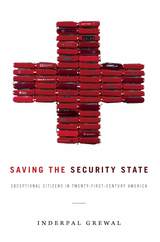
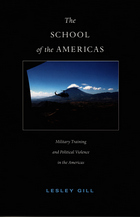
Based on her unprecedented level of access to the School of the Americas, Gill describes the School’s mission and training methods and reveals how its students, alumni, and officers perceive themselves in relation to the dirty wars that have raged across Latin America. Assessing the School’s role in U.S. empire-building, she shows how Latin America’s brightest and most ambitious military officers are indoctrinated into a stark good-versus-evil worldview, seduced by consumer society and the “American dream,” and enlisted as proxies in Washington’s war against drugs and “subversion.”

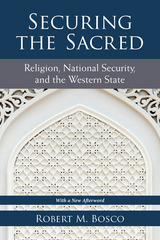
Despite significant theoretical distinctions between securitization on the domestic and the international levels, he finds that the outcome of addressing religion within the context of security hinges upon partnerships. Whereas states may harness the power of international allies, they cannot often find analogous domestic allies; therefore, states that attempt to securitize religion at home are more vulnerable to counterattack and more likely to abandon their efforts. Securing the Sacred makes a significant contribution to the fields of political theory, international relations, Islamic studies, and security/military studies.
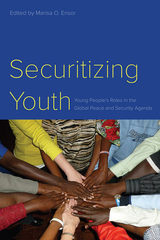
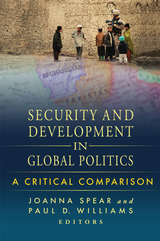
Security and development matter: they often involve issues of life and death and they determine the allocation of truly staggering amounts of the world’s resources. Particularly since the start of the wars in Afghanistan and Iraq, there has been momentum in policy circles to merge the issues of security and development to attempt to end conflicts, create durable peace, strengthen failing states, and promote the conditions necessary for people to lead healthier and more prosperous lives.
In many ways this blending of security and development agendas seems admirable and designed to produce positive outcomes all around. However, it is often the case that the two concepts in combination do not receive equal weight, with security issues getting priority over development concerns. This is not desirable and actually undermines security in the longer term. Moreover, there are major challenges in practice when security practitioners and development practitioners are asked to agree on priorities and work together.
Security and Development in Global Politics illuminates the common points of interest but also the significant differences between security and development agendas and approaches to problem solving. With insightful chapter pairings—each written by a development expert and a security analyst—the book explores seven core international issues: aid, humanitarian assistance, governance, health, poverty, trade and resources, and demography. Using this comparative structure, the book effectively assesses the extent to which there really is a nexus between security and development and, most importantly, whether the link should be encouraged or resisted.
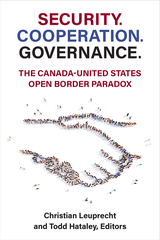
The book’s findings show that border governance straddles multiple regional, sectoral, and security scales in ways rarely documented in such detail. These developments have precipitated an Open Border Paradox: extensive, regionally varied flows of trade and people have resulted in a series of nested but interdependent security regimes that function on different scales and vary across economic and policy sectors. These realities have given rise to regional and sectoral specialization in related security regimes. For instance, just-in-time automotive production in the Great Lakes region varies considerably from the governance of maritime and intermodal trade (and port systems) on the Atlantic and Pacific coasts, which in turn is quite different from commodity-based systems that manage diverse agricultural and food trade in the Canadian Prairies and US Great Plains.
The paradox of open borders and their legitimacy is a function of robust bilateral and multilevel governance based on effective partnerships with substate governments and the private sector. Effective policy accounts for regional variation in integrated binational security and trade imperatives. At the same time, binational and continental policies are embedded in each country’s trade and security relationships beyond North America.
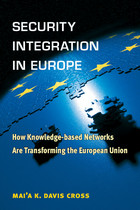
At a time when many observers question the EU’s ability to achieve integration of any significance, and indeed Europeans themselves appear disillusioned, Mai’a K. Davis Cross argues that the EU has made remarkable advances in security integration, in both its external and internal dimensions. Moreover, internal security integration—such as dealing with terrorism, immigration, cross-border crime, and drug and human trafficking—has made even greater progress with dismantling certain barriers that previously stood at the core of traditional state sovereignty.
Such unprecedented collaboration has become possible thanks to knowledge-based transnational networks, or “epistemic communities,” of ambassadors, military generals, scientists, and other experts who supersede national governments in the diplomacy of security decision making and are making headway at remarkable speed by virtue of their shared expertise, common culture, professional norms, and frequent meetings. Cross brings together nearly 80 personal interviews and a host of recent government documents over the course of five separate case studies to provide a microsociological account of how governance really works in today’s EU and what future role it is likely to play in the international environment.
“This is an ambitious work which deals not only with European security and defense but also has much to say about the policy-making process of the EU in general.”
—Ezra Suleiman, Princeton University
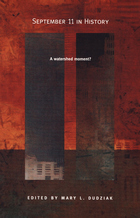
From a variety of perspectives, the contributors to this collection scrutinize claims about September 11, in terms of both their historical validity and their consequences. Essays range from an analysis of terms like “ground zero,” “homeland,” and “the axis of evil” to an argument that the U.S. naval base at Guantánamo Bay has become a site for acting out a repressed imperial history. Examining the effect of the attacks on Islamic self-identity, one contributor argues that Osama bin Laden enacted an interpretation of Islam on September 11 and asserts that progressive Muslims must respond to it. Other essays focus on the deployment of Orientalist tropes in categorizations of those who “look Middle Eastern,” the blurring of domestic and international law evident in a number of legal developments including the use of military tribunals to prosecute suspected terrorists, and the justifications for and consequences of American unilateralism. This collection ultimately reveals that everything did not change on September 11, 2001, but that some foundations of democratic legitimacy have been significantly eroded by claims that it did.
Contributors
Khaled Abou el Fadl
Mary L. Dudziak
Christopher L. Eisgruber
Laurence R. Helfer
Sherman A. Jackson
Amy B. Kaplan
Elaine Tyler May
Lawrence G. Sager
Ruti G. Teitel
Leti Volpp
Marilyn B. Young

Shadow Lives reveals the unseen side of the '9/11 wars': their impact on the wives and families of men incarcerated in Guantanamo, or in prison or under house arrest in Britain and the US. Victoria Brittain shows how these families have been made socially invisible and a convenient scapegoat for the state in order to exercise arbitrary powers under the cover of the 'War on Terror'.
A disturbing exposé of the perilous state of freedom and democracy in our society, the book reveals how a culture of intolerance and cruelty has left individuals at the mercy of the security services’ unverifiable accusations and punitive punishments.
Both a j'accuse and a testament to the strength and humanity of the families, Shadow Lives shows the methods of incarceration and social control being used by the British state and gives a voice to the families whose lives have been turned upside down. In doing so it raises urgent questions about civil liberties which no one can afford to ignore.
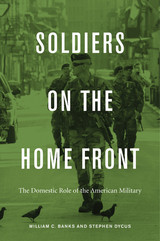
When crisis requires American troops to deploy on American soil, the country depends on a rich and evolving body of law to establish clear lines of authority, safeguard civil liberties, and protect its democratic institutions and traditions. Since the attacks of 9/11, the governing law has changed rapidly even as domestic threats—from terror attacks, extreme weather, and pandemics—mount. Soldiers on the Home Front is the first book to systematically analyze the domestic role of the military as it is shaped by law, surveying America’s history of judicial decisions, constitutional provisions, statutes, regulations, military orders, and martial law to ask what we must learn and do before the next crisis.
America’s military is uniquely able to save lives and restore order in situations that overwhelm civilian institutions. Yet the U.S. military has also been called in for more coercive duties at home: breaking strikes, quelling riots, and enforcing federal laws in the face of state resistance. It has spied on and overseen the imprisonment of American citizens during wars, Red scares, and other emergencies. And while the fears of the Republic’s founders that a strong army could undermine democracy have not been realized, history is replete with reasons for concern.
At a time when the military’s domestic footprint is expanding, Banks and Dycus offer a thorough analysis of the relevant law and history to challenge all the stakeholders—within and outside the military—to critically assess the past in order to establish best practices for the crises to come.

During the Cold War, the political leadership of the Soviet Union avidly sought intelligence about its main adversary, the United States. Although effective on an operational level, Soviet leaders and their intelligence chiefs fell short when it came to analyzing intelligence. Soviet leaders were often not receptive to intelligence that conflicted with their existing beliefs, and analysts were reluctant to put forward assessments that challenged ideological orthodoxy.
There were, however, important changes over time. Ultimately the views of an enlightened Soviet leader, Gorbachev, trumped the ideological blinders of his predecessors and the intelligence service’s dedication to an endless duel with their ideologically spawned “main adversary," making it possible to end the Cold War.
Raymond Garthoff draws on over five decades of personal contact with Soviet diplomats, intelligence officers, military leaders, and scholars during his remarkable career as an analyst, senior diplomat, and historian. He also builds on previous scholarship and examines documents from Soviet and Western archives. Soviet Leaders and Intelligence offers an informed and highly readable assessment of how the Soviets understood—and misunderstood—the intentions and objectives of their Cold War adversary.
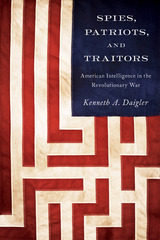
Students and enthusiasts of American history are familiar with the Revolutionary War spies Nathan Hale and Benedict Arnold, but few studies have closely examined the wider intelligence efforts that enabled the colonies to gain their independence. Spies, Patriots, and Traitors provides readers with a fascinating, well-documented, and highly readable account of American intelligence activities during the era of the Revolutionary War, from 1765 to 1783, while describing the intelligence sources and methods used and how our Founding Fathers learned and practiced their intelligence role.
The author, a retired CIA officer, provides insights into these events from an intelligence professional’s perspective, highlighting the tradecraft of intelligence collection, counterintelligence, and covert actions and relating how many of the principles of the era’s intelligence practice are still relevant today. Kenneth A. Daigler reveals the intelligence activities of famous personalities such as Samuel Adams, George Washington, Benjamin Franklin, Nathan Hale, John Jay, and Benedict Arnold, as well as many less well-known figures. He examines the important role of intelligence in key theaters of military operations, such as Massachusetts, New York, New Jersey, Pennsylvania, and in General Nathanael Greene’s campaign in South Carolina; the role of African Americans in the era’s intelligence activities; undertakings of networks such as the Culper Ring; and intelligence efforts and paramilitary actions conducted abroad.
Spies, Patriots, and Traitors adds a new dimension to our understanding of the American Revolution. The book’s scrutiny of the tradecraft and management of Revolutionary War intelligence activities will be of interest to students, scholars, intelligence professionals, and anyone who wants to learn more about this fascinating era of American history.

Students and enthusiasts of American history are familiar with the Revolutionary War spies Nathan Hale and Benedict Arnold, but few studies have closely examined the wider intelligence efforts that enabled the colonies to gain their independence. Spies, Patriots, and Traitors provides readers with a fascinating, well-documented, and highly readable account of American intelligence activities during the era of the Revolutionary War, from 1765 to 1783, while describing the intelligence sources and methods used and how our Founding Fathers learned and practiced their intelligence role.
The author, a retired CIA officer, provides insights into these events from an intelligence professional’s perspective, highlighting the tradecraft of intelligence collection, counterintelligence, and covert actions and relating how many of the principles of the era’s intelligence practice are still relevant today. Kenneth A. Daigler reveals the intelligence activities of famous personalities such as Samuel Adams, George Washington, Benjamin Franklin, Nathan Hale, John Jay, and Benedict Arnold, as well as many less well-known figures. He examines the important role of intelligence in key theaters of military operations, such as Massachusetts, New York, New Jersey, Pennsylvania, and in General Nathanael Greene’s campaign in South Carolina; the role of African Americans in the era’s intelligence activities; undertakings of networks such as the Culper Ring; and intelligence efforts and paramilitary actions conducted abroad.
Spies, Patriots, and Traitors adds a new dimension to our understanding of the American Revolution. The book’s scrutiny of the tradecraft and management of Revolutionary War intelligence activities will be of interest to students, scholars, intelligence professionals, and anyone who wants to learn more about this fascinating era of American history.

In literature and film the spy chief is an all-knowing, all-powerful figure who masterfully moves spies into action like pieces on a chessboard. How close to reality is that depiction, and what does it really take to be an effective leader in the world of intelligence?
This first volume of Spy Chiefs broadens and deepens our understanding of the role of intelligence leaders in foreign affairs and national security in the United States and United Kingdom from the early 1940s to the present. The figures profiled range from famous spy chiefs such as William Donovan, Richard Helms, and Stewart Menzies to little-known figures such as John Grombach, who ran an intelligence organization so secret that not even President Truman knew of it. The volume tries to answer six questions arising from the spy-chief profiles: how do intelligence leaders operate in different national, institutional, and historical contexts? What role have they played in the conduct of international relations and the making of national security policy? How much power do they possess? What qualities make an effective intelligence leader? How secretive and accountable to the public have they been? Finally, does popular culture (including the media) distort or improve our understanding of them? Many of those profiled in the book served at times of turbulent change, were faced with foreign penetrations of their intelligence service, and wrestled with matters of transparency, accountability to democratically elected overseers, and adherence to the rule of law. This book will appeal to both intelligence specialists and general readers with an interest in the intelligence history of the United States and United Kingdom.

Throughout history and across cultures, the spy chief has been a leader of the state security apparatus and an essential adviser to heads of state. In democracies, the spy chief has become a public figure, and intelligence activities have been brought under the rule of law. In authoritarian regimes, however, the spy chief was and remains a frightening and opaque figure who exercises secret influence abroad and engages in repression at home.
This second volume of Spy Chiefs goes beyond the commonly studied spy chiefs of the United States and the United Kingdom to examine leaders from Renaissance Venice to the Soviet Union, Germany, India, Egypt, and Lebanon in the twentieth century. It provides a close-up look at intelligence leaders, good and bad, in the different political contexts of the regimes they served. The contributors to the volume try to answer the following questions: how do intelligence leaders operate in these different national, institutional and historical contexts? What role have they played in the conduct of domestic affairs and international relations? How much power have they possessed? How have they led their agencies and what qualities make an effective intelligence leader? How has their role differed according to the political character of the regime they have served? The profiles in this book range from some of the most notorious figures in modern history, such as Feliks Dzerzhinsky and Erich Mielke, to spy chiefs in democratic West Germany and India.

Save when you purchase Volumes 1 and 2 in a bundle!
The first volume of Spy Chiefs broadens and deepens our understanding of the role of intelligence leaders in foreign affairs and national security in the United States and United Kingdom from the early 1940s to the present. The figures profiled range from famous spy chiefs such as William Donovan, Richard Helms, and Stewart Menzies to little-known figures such as John Grombach, who ran an intelligence organization so secret that not even President Truman knew of it. The volume tries to answer six questions arising from the spy-chief profiles: how do intelligence leaders operate in different national, institutional, and historical contexts? What role have they played in the conduct of international relations and the making of national security policy? How much power do they possess? What qualities make an effective intelligence leader? How secretive and accountable to the public have they been? Finally, does popular culture (including the media) distort or improve our understanding of them? Many of those profiled in the book served at times of turbulent change, were faced with foreign penetrations of their intelligence service, and wrestled with matters of transparency, accountability to democratically elected overseers, and adherence to the rule of law. This book will appeal to both intelligence specialists and general readers with an interest in the intelligence history of the United States and United Kingdom.
The second volume of Spy Chiefs goes beyond the commonly studied spy chiefs of the United States and the United Kingdom to examine leaders from Renaissance Venice to the Soviet Union, Germany, India, Egypt, and Lebanon in the twentieth century. It provides a close-up look at intelligence leaders, good and bad, in the different political contexts of the regimes they served. The contributors to the volume try to answer the following questions: how do intelligence leaders operate in these different national, institutional and historical contexts? What role have they played in the conduct of domestic affairs and international relations? How much power have they possessed? How have they led their agencies and what qualities make an effective intelligence leader? How has their role differed according to the political character of the regime they have served? The profiles in this book range from some of the most notorious figures in modern history, such as Feliks Dzerzhinsky and Erich Mielke, to spy chiefs in democratic West Germany and India.
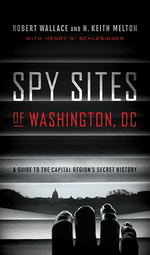
Washington Post Bestseller
Washington, DC, stands at the epicenter of world espionage. Mapping this history from the halls of government to tranquil suburban neighborhoods reveals scoresof dead drops, covert meeting places, and secret facilities—a constellation ofclandestine sites unknown to even the most avid history buffs. Until now.
Spy Sites of Washington, DC traces more than two centuries of secret history from the Mount Vernon study of spymaster George Washington to the Cleveland Park apartment of the “Queen of Cuba.” In 220 main entries as well as listings for dozens more spy sites, intelligence historians Robert Wallace and H. Keith Melton weave incredible true stories of derring-do and double-crosses that put even the best spy fiction to shame. Maps and more than three hundred photos allow readers to follow in the winding footsteps of moles and sleuths, trace the covert operations that influenced wars hot and cold, and understand the tradecraft traitors and spies alike used in the do-or-die chess games that have changed the course of history.
Informing and entertaining, Spy Sites of Washington, DC is the comprehensive guidebook to the shadow history of our nation’s capital.

Following an introduction by Padraig O'Malley, the book is divided into four sections: "Understanding the World as We Have Known It"; "Global Uncertainties"; "Whose Values? Whose Justice?"; and "Shaping a New World." The first section reviews what we have learned about war and establishes benchmarks for judging whether that knowledge is being translated into changes in the behavior of our political cultures. It suggests that the world's premier superpower, in its effort to promote Western-style democracy, has taken steps that have inhibited rather than facilitated democratization.
The second section examines the war on terror and the concept of global war. From the essays in this section emerges a consensus that democracy as practiced in the West cannot be exported to countries with radically different cultures, traditions, and values. The third section visits the question of means and ends in the context of varying value systems and of theocracy, democracy, and culture. In the final section, the focus shifts to our need for global institutions to maintain order and assist change in the twenty-first century.
Although each contributor comes from a different starting point, speaks with a different voice, and has a different ideological perspective, the essays reach startlingly similar conclusions. In sum, they find that the West has not absorbed the lessons from the wars of the last century and is inadequately prepared to meet the new challenges that now confront us.
Contributors to the volume include J. Brian Atwood, Susan J. Atwood, John Cooley, Romeo Dallaire, Ramu Damodaran, Valerie Epps, Michael J. Glennon, Stanley Heginbotham, Robert Jackson, Winston Langley, Alfred W. McCoy, Greg Mills, Jonathan Moore, Chris Patten, Gwyn Prins, Jonathan Schell, John Shattuck, Cornelio Sommargua, Brian Urquhart, Stephen Van Evera, and Robert Weiner.

By almost any measure, the United States is the most powerful nation in the history of civilization. Our resources are immense. But they are not limitless. Today national security requires agility to stay a step ahead of threats that can rapidly appear and change, and endurance to deal with challengers that are unlikely to disappear anytime soon. The central question for U.S. leaders today is how can we retain our strategic advantage and continue to set the agenda for world affairs? All our other goals—promoting freedom, prosperity, human rights, and ensuring the security of Americans—depend on getting the fundamentals right.
Strategic Advantage: Challengers, Competitors, and Threats to America's Future is a concise and provocative analysis of national security policy today—and tomorrow. Drawing on history and contemporary examples, Bruce Berkowitz deftly identifies those countries, groups, and movements that pose the greatest challenges to the United States and suggests ways to deal with them. He lucidly analyzes the components of national power—economic clout, military capability, and cultural influence—that America must sustain if it hopes to maintain its position in the world in the decades ahead.
Strategic Advantage outlines how the United States can stay ahead of potential threats by drawing on the distinctively American culture that rewards entrepreneurship and supports a strong military; by promoting economic growth at home and competing for talent and capital from abroad; by fixing the national security command structure; and by adopting a national strategy that balances goals, costs, and risks. With pacing, foresight, and planning, Berkowitz says, the United States can sustain its global leadership for the long haul.

How should the countries in the Baltic Sea region and their allies meet the strategic challenges posed by an openly aggressive and expansionist Russia? NATO and the nonaligned states in the region are now more concerned about an external threat than they have been since the end of the Cold War. Russia has been probing air space, maritime boundaries, and even land borders from the Baltic republics to Sweden. Russia's undermining of Ukraine and annexation of Crimea worries former Soviet republics with Russian minority populations, nonaligned Sweden and Finland are enhancing their cooperation with NATO, and the Trump presidency has created some doubt about America's willingness to follow through on NATO's collective defense commitment.
Ann-Sofie Dahl brings together an international group of experts to examine Baltic security issues on a state-by-state basis and to contemplate what is needed to deter Russia in the region. The contributors analyze ways to strengthen regional cooperation, and to ensure that security in the region stays at the top of the agenda at a time of many competing strategic perspectives in the transatlantic community. This book will be of great interest to foreign policy and defense practitioners in the US and Europe as well as scholars and students of international relations.

John A. Gentry and Joseph S. Gordon update our understanding of strategic warning intelligence analysis for the twenty-first century. Strategic warning—the process of long-range analysis to alert senior leaders to trending threats and opportunities that require action—is a critical intelligence function. It also is frequently misunderstood and underappreciated. Gentry and Gordon draw on both their practitioner and academic backgrounds to present a history of the strategic warning function in the US intelligence community. In doing so, they outline the capabilities of analytic methods, explain why strategic warning analysis is so hard, and discuss the special challenges strategic warning encounters from senior decision-makers. They also compare how strategic warning functions in other countries, evaluate why the United States has in recent years emphasized current intelligence instead of strategic warning, and recommend warning-related structural and procedural improvements in the US intelligence community. The authors examine historical case studies, including postmortems of warning failures, to provide examples of the analytic points they make. Strategic Warning Intelligence will interest scholars and practitioners and will be an ideal teaching text for intermediate and advanced students.

How domestic constraints hamper India’s foreign policy and its potential as a superpower
One of the most important developments in today’s changing international system is the emergence of India as a rising power. However, Rajesh Basrur finds that India is hobbled by serious domestic constraints. Subcontinental Drift explains why India’s foreign policy is often characterized by multiple hesitations, delays, and diversions that may ultimately hamper its rise.
Basrur analyzes the concept of policy drift through the lens of neoclassical realist theory to reveal why this drift occurs so regularly in Indian foreign policy and how it affects India’s quest for major power status. Using four cases—the India-US strategic partnership, India-Sri Lanka relations, India’s nuclear strategy, and crossborder terrorism—Basrur identifies two basic explanations for India’s indecision on critical issues. The first, involuntary drift, is related to the distribution of domestic material power, while the second, voluntary drift, is produced by a responsibility deficit.
Basrur develops a fresh theoretical basis for understanding the relationship between India’s foreign and domestic policies and introduces a series of theoretical refinements to neoclassical realism. Subcontinental Drift also provides advice on how policy makers might lower the costs of policy drift. This innovative analysis is essential to understanding the constraints around India’s foreign and domestic security decisions and how they will affect its rise.
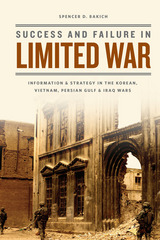
Traditional assessments of wartime strategy focus on the relationship between the military and civilians, but Bakich argues that we must take into account the information flow patterns among top policy makers and all national security organizations. By examining the fate of American military and diplomatic strategy in four limited wars, Bakich demonstrates how not only the availability and quality of information, but also the ways in which information is gathered, managed, analyzed, and used, shape a state’s ability to wield power effectively in dynamic and complex international systems.
Utilizing a range of primary and secondary source materials, Success and Failure in Limited War makes a timely case for the power of information in war, with crucial implications for international relations theory and statecraft.
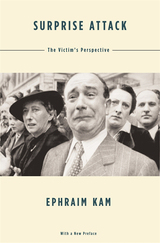

Surrogate Warfare explores the emerging phenomenon of “surrogate warfare” in twenty-first century conflict. The popular notion of war is that it is fought en masse by the people of one side versus the other. But the reality today is that both state and non-state actors are increasingly looking to shift the burdens of war to surrogates. Surrogate warfare describes a patron's outsourcing of the strategic, operational, or tactical burdens of warfare, in whole or in part, to human and/or technological substitutes in order to minimize the costs of war. This phenomenon ranges from arming rebel groups, to the use of armed drones, to cyber propaganda. Krieg and Rickli bring old, related practices such as war by mercenary or proxy under this new overarching concept. Apart from analyzing the underlying sociopolitical drivers that trigger patrons to substitute or supplement military action, this book looks at the intrinsic trade-offs between substitutions and control that shapes the relationship between patron and surrogate. Surrogate Warfare will be essential reading for anyone studying contemporary conflict.
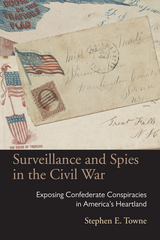
A History Book Club Reading Selection
Surveillance and Spies in the Civil War represents pathbreaking research on the rise of U.S. Army intelligence operations in the Midwest during the American Civil War and counters long-standing assumptions about Northern politics and society. At the beginning of the rebellion, state governors in Ohio, Indiana, and Illinois cooperated with federal law enforcement officials in various attempts—all failed—to investigate reports of secret groups and individuals who opposed the Union war effort.
Starting in 1862, army commanders took it upon themselves to initiate investigations of antiwar sentiment in those states. By 1863, several of them had established intelligence operations staffed by hired civilian detectives and by soldiers detailed from their units to chase down deserters and draft dodgers, to maintain surveillance on suspected persons and groups, and to investigate organized resistance to the draft. By 1864, these spies had infiltrated secret organizations that, sometimes in collaboration with Confederate rebels, aimed to subvert the war effort.
Stephen E. Towne is the first to thoroughly explore the role and impact of Union spies against Confederate plots in the North. This new analysis invites historians to delve more deeply into the fabric of the Northern wartime experience and reinterpret the period based on broader archival evidence.
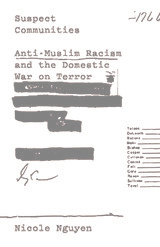
The first major qualitative study of “countering violent extremism” in key U.S. cities
Suspect Communities is a powerful reassessment of the U.S. government’s “countering violent extremism” (CVE) program that has arisen in major cities across the United States since 2011. Drawing on an interpretive qualitative study, it examines how the concept behind CVEaimed at combating homegrown terrorism by engaging Muslim community members, teachers, and religious leaders in monitoring and reporting on young peoplehas been operationalized through the everyday work of CVE actors, from high-level national security workers to local community members, with significant penalties for the communities themselves.
Nicole Nguyen argues that studying CVE provides insight into how the drive to bring liberal reforms to contemporary security regimes through “community-driven” and “ideologically ecumenical” programming has in fact further institutionalized anti-Muslim racism in the United States. She forcefully contends that the U.S. security state has designed CVE to legitimize and shore up support for the very institutions that historically have criminalized, demonized, and dehumanized communities of color, while appearing to learn from and attenuate past practices of coercive policing, racial profiling, and political exclusion.
By undertaking this analysis, Suspect Communities offers a vital window into the inner workings of the U.S. security state and the devastating impact of CVE on local communities.
READERS
Browse our collection.
PUBLISHERS
See BiblioVault's publisher services.
STUDENT SERVICES
Files for college accessibility offices.
UChicago Accessibility Resources
home | accessibility | search | about | contact us
BiblioVault ® 2001 - 2024
The University of Chicago Press









